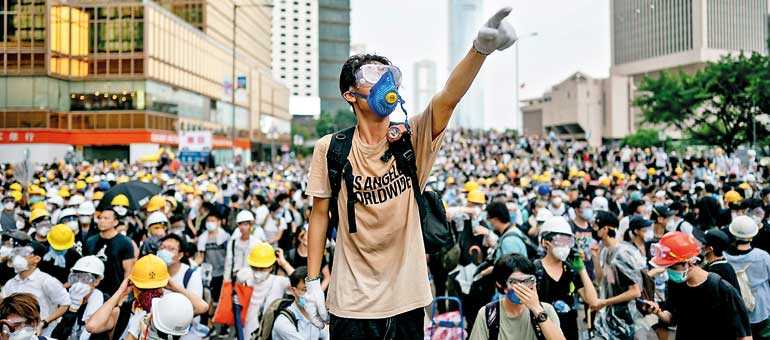Friday Feb 20, 2026
Friday Feb 20, 2026
Saturday, 9 November 2019 00:07 - - {{hitsCtrl.values.hits}}

Hong Kong today has come to be an interesting case for drawing significant lessons for rest of the world and especially for understanding the whole psychopathology of these trends of protests undermining authorities worldwide
Britain, Bolivia, Chile, Iraq, Lebanon, Spain, Mexico, Venezuela and several other nations have witnessed widespread protests hitting global headlines. Some of these have been extremely destructive, leading to deaths and destruction, while others have hit various intangibles like brand equity, social stability and peace, and political prestige.
China’s Hong Kong Autonomous Region has especially become the centre of storm for at least four reasons:
First, Hong Kong is a special autonomous region of China whose four decades of unprecedented rise has pushed it to the very centre-stage of global governance structures and processes with ever increasing system shipping capabilities.
Second, Hong Kong’s has had a history of special relations with United Kingdom and the rest of the west which makes them stakeholders in its political situation where Basic Law outlines its piecemeal 50-year project of blending with mainland China.
Third, these protests in Hong Kong have continued inordinately; now entering its 22nd week, and while it has had virtually no human causalities, its major hit has been on pro-Beijing business brands and on the decorum of this financial hub where visitors have now fallen to half.
Finally, with this week’s figure showing a continuous second quarter of contraction Hong Kong has formerly entered a period of recession which seems strange given that rest of China’s growth rates continue to defy global trends of economic deceleration.
Hong Kong today has come to be an interesting case for drawing significant lessons for rest of the world and especially for understanding the whole psychopathology of these trends of protests undermining authorities worldwide.
At the very outset these protests can no longer be explained in terms of lack of or unbalanced human development. Before, there were coloured revolutions and street sit-ins and some of  them had brought down powerful authoritarian regimes. These were the last genre of popular protest that could be linked to economic stagnation or increasing cost of living.
them had brought down powerful authoritarian regimes. These were the last genre of popular protest that could be linked to economic stagnation or increasing cost of living.
Traditionally, poverty has been ascribed as reason for such street protests, petty violence and crime but development levels no longer provide any convincing explanation for to what has come to be highly organised enterprise requiring specialist skill in event management expertise.
That is what makes trajectories of their quick onset and peak so identical replicating look alike events in various countries. In each cases it shows up as a sudden upsurge of mass marches on streets which are soon accompanied by rioting and vandalism leaving authorities overwhelmed and incapacitated. Authorities lose face for their inability to contain, leave alone negotiate with protestors and betray their lack of connect with masses. Protestors on the other hand have benefactors and sympathisers beyond their national boundaries.
Like the happy rage of pop music replicating itself in multiple languages world over, these largely urban protest showcase similar banners, internet modelling, colour coding of ‘enemies’ presenting similar genre but with different fonts, scripts, shades and ethnic makeup of their protagonists.
Deeper diversity of cultures does not show much impact and there is little variance in their substance or style. The focus remains in visibility and all kinds of media is put to use making its reportage sometimes making a monster of a molehill providing a certain permanency to what is essentially a transitory exercise of seeking redressal to grievances.
No doubt each case has had its unique triggers yet they all share a common thread of excessive use of social media platforms for advertising their grievances. This moves focus away from seeking resolutions through negotiating with authorities who get painted as enemies.
Social media indeed seems to empower these multitudes of men and women into far higher assertiveness, igniting higher expectations and thereby ensuring momentum to protests by deepening popular disaffections with their respective ruling elites. This is rooted in their shared but exaggerated sense of rulers being the sole reason for unfair distribution of resources or unbalanced development.
The narrative is often how externally driven injections of free-market driven opening and structural reforms have catapulted few to unprecedented heights while leaving larger masses to the margins of upwards mobility.
This high-octane drill turns into unique protester personalities making those who began with those who took initiative to use protests as method to seek redressal to grievance as nothing more than prisoners of their own initiative.
Continued protests provide refuge to angst and anxieties of those not engaged in productive actives and for the greed of criminals, thieves and quick-returns-seeking aspirants in politics. Others use this protests as platforms for their poetry, passion for music and other creative skills including buffoonery.
All this is welcome as it provided boost to sustain mass marches no matter how it also pushes protests into a whole new escalating spiral of high-octane, shrill speeches making these far more uncompromising while expanding their agenda to accommodate demands other elements who gradually join these protests driven by their own real or imagined causes.
Like terrorism, protestors are increasingly becoming at least inspired by if not deeply networked worldwide. They are also germinating connections with vested interest in adversary countries that sustains their zeal and energy. But blaming this tinkering by vested powers remains the strategy of weak and unwise.
The world still lives as nation-states and it remains incumbent on their power-elites – being the privileged beneficiaries with much higher stakes in extant systems of governance – to take bold initiatives and make major compromises.
Protests have become increasingly less likely to dissipate in exhaustion and with each passing of the day protracted conflicts of interest become inordinately difficult to untie. Power elites can allow that only on their own peril.
(The writer is Professor at School of International Studies, Jawaharlal Nehru Univeristy, New Delhi.)